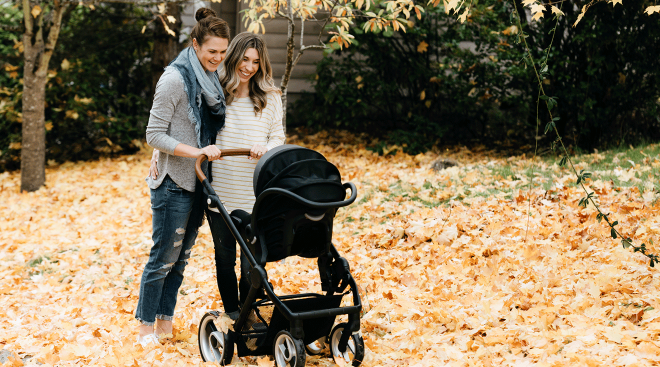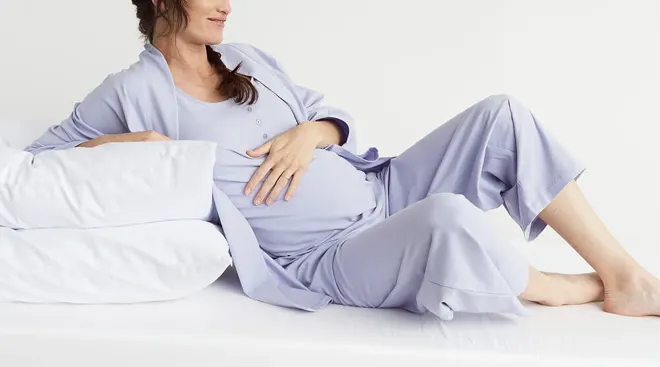- You’re in the midst of the second trimester, which means those unpleasant early symptoms (extreme exhaustion and morning sickness) have probably given way to other issues: increased vaginal discharge and stretch marks—to name a few.
- Sorry tummy sleepers, it’s time to find a new slumber position. Sleeping on your belly could interfere with blood flow to baby. Side sleeping is ideal and recommended at this point.
- If you had an amniocentesis with inconclusive results, you may be scheduled for a cordocentesis this week (more on that below).
- At this time, baby is developing fast and has already mastered the sucking reflex. (Get those binkies ready!)
You’re at week 17 of your pregnancy; that’s almost halfway through, and there’s so much to do, it can be overwhelming. Our best advice? Don’t try to do it all yourself—ask for help. And whatever doesn’t get done? You’ll find it’s not that important anyhow.
Baby's rubbery cartilage is now turning to bone. And baby is growing some meat on those bones, putting on some fat, which will not only make baby look less like an alien and more like a chubby human but will also help their body do important things like regulate their temperature and metabolism. Putting on body fat now may even help baby be healthier later on, helping their brain develop correctly and possibly reducing the risk of some diseases.
Baby’s heart is pumping blood, and the placenta is working extra-hard, growing to accommodate the blood vessels needed to supply baby with nutrients and oxygen and removing their waste. Their umbilical cord is also getting longer and stronger to make sure it can meet their needs.
Around this time, baby develops the vernix, a slick, white substance that forms a barrier for the skin to protect it from the amniotic fluid.
How big is baby at 17 weeks?
A baby at pregnancy week 17 is the size of a pomegranate. Your 17-week fetus is about 5.1 inches long and weighs about 5.9 ounces.
17 weeks pregnant is how many months?
At 17 weeks pregnant, you're four months pregnant. But here's the catch: Pregnancy is technically longer than nine months—it's 40 weeks long, and if you assign four weeks to a month, that's 10 months long. Of course, some months have slightly more than four weeks. It can all get a little confusing, which is why doctors track pregnancy by week, not month.
17 week ultrasound
You may have a 17 weeks pregnant ultrasound if you’ve opted to have a cordocentesis. In this procedure, umbilical cord blood is tested for signs of chromosomal abnormalities. The doctor uses an ultrasound to find the place where the cord meets the placenta—that’s the spot where they need to remove the blood. Typically, this diagnostic test is performed after 17 weeks; it may be used if amniocentesis results were inconclusive and you and your partner want a more definitive answer about baby’s health.
What is baby doing at 17 weeks in the womb?
Baby is moving around your uterus. The limb coordination happening during week 16 has helped Baby become pretty mobile this week! They can move their joints and are bouncing, flipping and turning around in the amniotic sac, testing out their gymnastic abilities. If this isn’t your first pregnancy, you may already notice some of these movements, but don’t worry if you’re not. At 17 weeks, many expectant moms haven’t felt baby move yet.
When you’re 17 weeks pregnant, symptoms are most commonly due to your rapidly growing baby. Here’s what you’re likely feeling this week:
Increased bodily fluids
Vaginal discharge, sweat, mucus and other fluids are in full force because of your increased blood flow.
Weird dreams
You gave birth to a chipmunk? Married your boss? Having strange dreams might be caused by your hormones, but it might also be the result of your nerves and anticipation.
Itchy boobs and belly
As baby is growing, your skin is stretching thinner and can be more sensitive. Resist the urge to scratch, and find a soothing skin cream that eases the itch.
More rapid weight gain
You may have gained about 5 to 10 pounds by now. It’s normal to gain about 1 pound per week in the second trimester. Sudden or excessive weight gain could be a sign of a problem though, so talk to your OB if it’s higher than that.
Stretch marks
As you’re putting on some pounds and your uterus continues to expand, getting some stretch marks might be inevitable (especially if you’re 17 weeks pregnant with twins!). It’s different for every woman. Drink lots of water to stay hydrated and use a good quality moisturizer to try to combat them.
Baby is working on getting stronger, and your 17 weeks pregnant body is working on getting bigger—about 1 pound bigger per week. (Weight gain should be about the same if you’re 17 weeks pregnant with twins.) Make sure you document your growing 17 weeks pregnant belly by taking lots of photos. We promise: One day you’re going to look back and reminisce about this time. You’ll want to have a keepsake of how your body changed.
Can I feel baby at 17 weeks?
Those first exciting kicks you may be feeling at week 17 have a name: the quickening. Those sensations are wonderful, but don’t be worried if you haven’t felt them yet (especially if this is your first pregnancy). It’s different for every woman, but baby’s first movements are typically felt any time between 16 and 22 weeks.
Can I lie on my stomach at 17 weeks pregnant?
It’s time to find a new position for sleeping. When you’re on your back, your growing baby and uterus put pressure on a big blood vessel, the inferior vena cava. This can interfere with blood flow to baby, and it can lower your blood pressure. It’s best for your 17 week baby bump to start sleeping on your left side for optimal blood flow. (Really, any position other than flat on your back is fine, if you are a back-sleeper, tuck a pillow under one hip to tilt your belly to the side)
Consider taking a birthing class or listen to a pregnancy podcast, or even google prenatal yoga classes near you to help you connect with your body and reduce any stress and worry you may be experiencing. Remember, there are many ways to prepare your body and mind for this journey ahead, so try to avoid overwhelm by recognizing that you don't need to know everything, just stick with the resources that resonate with you and feel like something you would like to explore.
Here’s what you can do this week to keep yourself happy, healthy and feeling great.
Take cooling showers
Look, pregnancy is hard work, so it’s natural to have extra perspiration. Pregnant people are more likely to experience heat-related illness. That’s because your body is doing what it must to keep baby cool too! Rest, wear loose clothing, drink plenty of water and talk to your doctor about how you should replace the salts and other minerals you lose through sweat. Try cooling down in the morning with a slightly colder shower than you may be used to.
Stop the itch
Don’t let itchy skin drive you crazy. Soothe your 17 weeks pregnant belly with aloe vera gel to lock in moisture. For double the hydration, combine some aloe vera gel with a moisturizer that has vitamin E or cocoa butter to really nourish your skin.
Practice portion control
You’re eating for two, but don’t go overboard—you should consume between 200 and 400 extra calories per day to nourish you and baby at 17 weeks, depending on your pre-pregnancy weight and physical activity level. Focus on eating small meals made up mainly of lean protein, produce, whole grains and heart-healthy fats.
Wear the right underwear
Vaginal discharge isn’t fun, but it doesn’t have to be uncomfortable. Wear breathable cotton underwear to stay cool and dry. If you need extra protection, try an unscented pantiliner.
Frequently Asked Questions
Is it normal if I still can't feel baby move yet?
Yes! It’s normal to not feel baby move at this point. That typically happens sometime between 18 and 24 weeks. This is especially true for first-time moms, who may not know how to identify what they’re feeling. Quickening—or early fetal movement—can easily be mistaken for gas bubbles.
Of course, this timeline varies from woman to woman: some moms notice quickening at the end of their first trimester, especially if they already know what it feels like, while other moms won’t be able to feel anything resembling tiny, tapping feet until they’ve hit the six-month mark. Most experts recommend starting to count kicks by week 28, so talk to your provider if you’re not sure you’re feeling baby move before then.
Can I go to the dentist during pregnancy?
You can and should go to the dentist during pregnancy, though there may be some limitations to the services and procedures you can safely receive. Your oral care can be impacted by your pregnancy, with hormones potentially causing an increase in plaque, gingivitis and cavities.
Additionally, it’s important to avoid gum disease during pregnancy because it’s been linked to preterm birth. Of course, while regular cleanings, cavity fillings, local anesthesia and even dental x-rays, as needed, are all safe during pregnancy, you should avoid elective or non-emergency procedures (like teeth whitening, for example) until after baby has been born.
Is it normal that I keep getting nosebleeds during pregnancy?
Unfortunately, it’s pretty common to have nosebleeds during pregnancy. One reason for this is pregnancy rhinitis, or inflammation and swelling of the mucus membranes in the nose. Pregnancy congestion is usually caused by rising levels of estrogen and progesterone. Another reason for nosebleeds is that your body circulates a lot more blood during pregnancy, and there’s an increase in blood flow to the nasal tissues.
Keeping the air in your environment moist with a humidifier can help pregnancy nosebleeds, and so can using saline nasal sprays. If you can’t stop the bleeding or you have high blood pressure, contact your provider right away.
How can I prevent varicose veins during pregnancy?
Similar to stretch marks, varicose veins during pregnancy are common and often hereditary, meaning there may not be anything you can do to prevent these unsightly (and sometimes itchy or downright painful!) enlarged veins. However, there are some strategies for treating and preventing varicose veins during pregnancy:
- Change positions frequently
- Elevate your legs and feet when sitting
- Exercise daily
- Wear maternity stockings or pantyhose
- Wear non-heeled, supportive shoes
- Keep your legs uncrossed while seated
- Sleep on your left side
- Stay hydrated and limit your sodium intake
Can stress affect my pregnancy in the second trimester?
Chronic or frequent stress can affect your pregnancy—not only negatively impacting your own nervous system but baby’s too. While every expectant mom experiences some amount of normal stress during pregnancy, extended periods of stress or extreme stress caused by serious issues like depression, anxiety and difficult life events can have long-lasting effects. Stress can increase your risk of poor sleep, weight gain issues (either too much or too little), high blood pressure, preeclampsia and gestational diabetes. Stress can also put baby at a higher risk for being born prematurely or at a low birth weight.
We found out I was pregnant on our first wedding anniversary. At 10 weeks, we told our families by adding a picture of a sonogram to the end of the wedding albums we gifted them. For baby 2, we wrapped a bunch of big brother things for my son to open at his family birthday party.
Please note: The Bump and the materials and information it contains are not intended to, and do not constitute, medical or other health advice or diagnosis and should not be used as such. You should always consult with a qualified physician or health professional about your specific circumstances.
Monte Swarup, MD, FACOG, is an ob-gyn in Chandler, Arizona and founder of HPV HUB. He earned his medical degree from the University of Pittsburgh School of Medicine.
American Pregnancy Association, Fatigue During Pregnancy
Cleveland Clinic, Morning Sickness, April 2023
Mayo Clinic, 2nd Trimester Pregnancy: What to Expext, March 2022
Sleep Foundation, [Sleeping While Pregnant: Second Trimester}(https://www.sleepfoundation.org/pregnancy/sleeping-during-2nd-trimester),,) March 2023
Cleveland Clinic, Cordocentesis, October 2022
Mayo Clinic, Fetal Development: The 2nd Trimester, June 2022
American Pregnancy Association, 17 Weeks Pregnant
American College of Obstetricians and Gynecologists, How Long Does Pregnancy Last?, October 2020
American Pregnancy Association, Cordocentesis: Percutaneous Umbilical Blood Sampling (PUBS)
Fertility and Sterility, Prospective Evaluation of Hot Flashes During Pregnancy and Postpartum, September 2013
Auris Nasus Larynx, Medical Management of Rhinitis in Pregnancy, December 2022
Cardiovascular Journal of Africa, Physiological Changes in Pregnancy, April 2016
American Pregnancy Association, Pregnancy Dreams
American College of Obstetricians and Gynecologists, Skin Conditions During Pregnancy, December 2021
American College of Obstetricians and Gynecologists, How Much Weight Should I Gain During Pregnancy?, August 2021
Mayo Clinic, Preeclampsia, April 2022
American Pregnancy Association, What Can be Done to Prevent Stretch Marks?
American Pregnancy Association, Weight Gain With Twins
Cleveland Clinic, Quickening in Pregnancy, April 2022
Sleep Foundation, Pregnancy and Sleep, March 2023
Centers for Disease Control and Prevention, Heat and Pregnant Women, August 2022
Iranian Journal of Medical Science, The Effect of Aloe Vera Clinical Trials on Prevention and Healing of Skin Wound: A Systematic Review, January 2019
Cleveland Clinic, Vitamin E for Skin: What Does it Do?, February 2022
Nutrients, Cocoa Bioactive Compounds: Significance and Potential for the Maintenance of Skin Health, August 2014
Centers for Disease Control and Prevention, Tracking Your Weight for Women Who Begin Pregnancy Overweight
American Pregnancy Association, Pregnancy Nutrition
U.S. Department of Health & Human Services Office of Disease Prevention and Health Promotion, Eat Healthy During Pregnancy: Quick Tips, May 2023
Planned Parenthood, Underwear: The Fabric of Our Lives, August 2017
American Dental Association, Pregnancy and your dental health
BMC Pregnancy and Childbirth, Assessing the association between periodontitis and premature birth: a case-control study, March 2021
American Pregnancy Association, Pregnancy and Dental Work
American Pregnancy Association, Nosebleeds During Pregnancy
Kaiser Permanente, Pregnancy: Nosebleeds and Bleeding Gums
Nemours Kids’ Health, Why Do Some Pregnant Women Get Varicose Veins?
Nemours Kids’ Health, Why Do Some Pregnant Women Get Varicose Veins?
Learn how we ensure the accuracy of our content through our editorial and medical review process.
Navigate forward to interact with the calendar and select a date. Press the question mark key to get the keyboard shortcuts for changing dates.















































